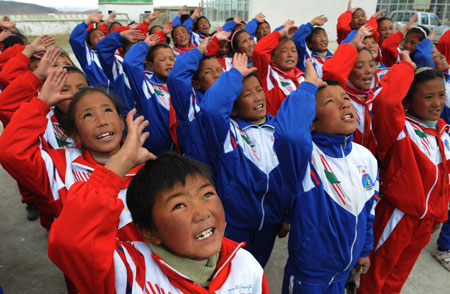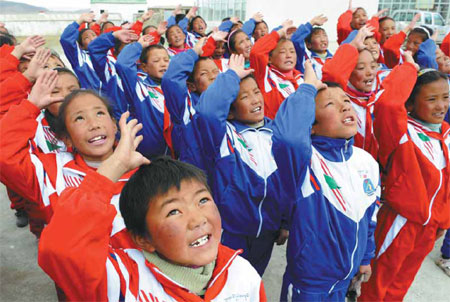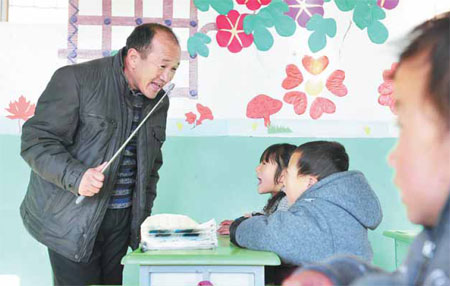School mergers to benefit students
Updated: 2014-02-21 07:06
By Cao Yin in Beijing and Luo Wangshu in Chongqing (China Daily USA)
|
||||||||
Sharing of teachers, education resources would assist less-privileged institutions, report Cao Yin in Beijing and Luo Wangshu in Chongqing.
Cai Xiaodong is considering a radical measure. The principal of the Experimental High School attached to Beijing Normal University, a key institution in the Chinese capital, is planning a merger with the nearby, but less-renowned, Beijing Erlonglu Middle School.
"The schools will become an 'education league', sharing teaching resources and management philosophy," Cai said, adding that the move would allow teachers to rotate between the schools and promote educational equality.
Beijing Mayor Wang Anshun expressed interest in the proposal in January, saying the project would allow principals to have a greater influence on the futures of a larger number of students. But he also urged caution when putting the idea into practice.
Cai's move came in response to a directive by the Communist Party of China Central Committee in November urging local governments to rotate leaders and teachers from top-ranked schools to less-privileged institutions and balance teaching resources.
Three other principals in the Xicheng district of Beijing are also considering involvement with the education league.
Tan Chuanbao, a professor of education policy at Beijing Normal University, believes that rotating teachers through different schools would be an effective way of balancing teaching resources and ensuring the quality of education over the long term.
In some other countries, most notably Japan, teacher rotation is standard practice, according to Tan. "No teacher stays at just one school during his or her teaching career," he said.
While the idea has won praise from some quarters, some education professionals have expressed concerns, arguing that "blind" rotation may lower the quality of teaching and adversely affect teachers' lives.
Gao Xia, a curriculum and pedagogy researcher at the National Institute of Education Sciences, urged in-depth preparation before the policy is put into operation.
"The implementation of the rotation mechanism requires greater legal support. The lack of an overarching plan in our education system means it's crucial that we remain cautious and avoid stopgap measures when carrying out the policy," she said.
Balancing resources
Tan said he was pleased to see some schools taking the first steps to discover innovative ways of promoting staff rotation. "For many years, there was just empty talk instead of action," he said.
It's the first time that such a policy has been written into a major document during a plenary session, leading experts to regard it as proof that the leadership plans to balance resources in compulsory education between urban and rural areas.
In addition to standardizing teaching quality and resource allocation in public schools, the plan also signals a desire to abolish "key" schools - those with the best teachers and the most-talented students - and tackle the problems that parents face when attempting to get their children admitted to high-ranked schools.
In November, Xu Tao, director of the ministry's Department of Teacher Education, told a news conference that the ministry and other government departments will release guidelines soon. They will be aimed at implementing rotation and improving communications between teachers and principals of schools at different levels.
Xu said a systematic and lasting rotation mechanism would be established within three to five years, before expanding the trial over a larger area.
If the plan is implemented, teachers in the compulsory education sector will be managed by county-level education authorities instead of specific schools.
Quality of teaching
Cai's proposal has been hailed as a good example of how to establish a rotation mechanism. However, he admitted that when he first studied the system, he was concerned that the quality of teaching in the two schools could be affected if the mechanism was not well thought through.
"If I just transferred two or three teachers from my school to another one, I don't think the meager resources would contribute a great deal to the partner school," he said. "Conversely, if most of my teachers moved, I would be concerned about the quality of teaching at my own school."
Those concerns led Cai to formulate his proposal, and he's now looking into ways of putting his plan into effect.
Tian Shulin, head of Beijing No 80 High School, a key establishment in the city's Chaoyang district, is exploring other means of pushing the rotation plan forward.
In 2013, Tian agreed to cooperate with a school in Wenyuhe, a rural area of Chaoyang where most of the students are the children of migrant workers. She dispatched three teachers, including a school vice-president, to Wenyuhe in a bid to share teaching resources and conduct research.
"The vice-president has become the headmaster at the rural school, managing the students and developing study methods based on his education philosophy," she said. "He not only shares his teaching experience, but is also learning what our partner school needs for its daily work."
When new teachers joined the two schools, Tian arranged for them to be trained together so they could discuss theories and ideas.
"Communication is really important. The quality of teaching will only improve, and the students will only enjoy good resources, if the teachers in the schools are familiar with one another and interact well," she said.
Tian also provided overseas study opportunities for teachers from the partner school, treating them equally with the teachers at her own school. "Teacher rotation should be based on a good understanding between schools, otherwise it will just scratch the surface and lead to a dead end," she added.
Outside Beijing
Far from the capital, township governments in Hunan province are responsible for hiring art, music and physical education teachers in rural areas, meaning that they are employed by the township rather than a specific school.
In other regions, such as the central metropolis of Chongqing, the idea is also under consideration.
During the municipality's People's Political Consultative Conference in January, Mu Yanlin, deputy director of Chongqing's education commission, confirmed that work was being undertaken to formulate the details of the mechanism.
In addition, an education alliance has been established among nine schools in Chongqing, including one in a rural area, and at Chongqing Shuren Primary School, a key primary in the municipality.
Liu Hongbin, deputy principal at Chongqing Shuren, said her teachers will rotate to rural schools within the municipality for one or two years, during which time they will receive a higher wage from the district education authority. They will be expected to hold occasional seminars to exchange ideas about educational philosophy and tips on work plans and teaching methods. In one district, Chongqing Shuren also cooperates with other schools, whose teachers visit every week to see how classes are conducted and to discuss teaching methods.
Teachers' welfare
Although some principals agreed that the rotation mechanism would be an effective way of boosting educational equality, many still have concerns.
In addition to the effect on quality, Liu was concerned about the teachers' welfare.
"At our school, a teacher is responsible for a class for the entire six years, which means a solid relationship is established between teachers and students," she said. "The rotation mechanism may adversely affect that consistency and result in a negative effect on the students' studies."
Zhang Ting, a high school teacher from a key high school in Beijing, echoed Liu's views, saying that if she were rotated, she would need time to adapt to a new environment.
"I have to take time to understand my new students. It wouldn't help if I knew little about them, and it could even be counterproductive," she said. "Being rotated around schools would make it difficult for me to work out where I belong and which school I'm serving. In addition, teachers in different schools will receive different subsidies and benefits."
Huang Shaobing, vice-president of Wushan High School in Chongqing, said that few of his teachers are willing to work in the rural areas.
"It's hard to push the rotation idea, partly because the facilities at rural schools are not comparable with those in urban areas," he said.
Tian also expressed some reservations. "We should develop an overriding plan for education, not just a simple teacher exchange. If the teachers are unable to agree on an education philosophy, blind rotation won't bear fruit.
The system overseas
Gao also foresaw difficulties and proposed that the education authorities should learn from other countries. "In Japan, public schools are the responsibility of local governments, meaning there is no difference in quality between urban and rural schools," she said.
The regulations governing schools in Japan provide strict standards for the use of facilities, "which leaves no gaps among schools", she said.
To reinforce the system, Japan's Education Civil Servant Law states that teachers in public schools are regional civil servants and details the rotation mechanism.
In Japan, teachers care more about their careers instead of worrying about which school they serve, and they are fully conversant with the country's rotation mechanism, according to Gao.
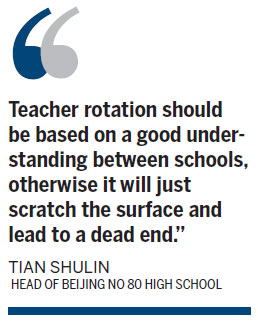
The local government pays teachers according to their experience and is responsible for their assignment to different schools. The system relieves teachers' natural concerns about income differentials, she added.
In Gao's view, the provision of legal support and well-prepared facilities are of paramount importance and must be ensured before any rotation mechanism is implemented.
In terms of basic education, the government should treat all schools as equals. However, over the years the education authorities have injected a greater amount of funding into key schools, thus jeopardizing the chances of equal development and possibly even leading to discrimination in favor of more-prestigious establishments.
Gao said it would be difficult to implement the rotation system if the majority of teachers refuse to take part, but stressed that they should not be blamed or accused of being selfish, "because society has not provided the soil for them to think in that way for long time".
Tan praised the rotation method used in Japan and suggested that local governments should play an important role in narrowing the divides between schools in China.
They can provide financial support to balance facilities in every school, and provide a transport subsidy for rotated teachers, many of whom will have to travel long distances to work, he said.
"In every change or improvement, some people will end up paying a price," he said. "If our educational staff object and don't want to give up their own interests, it will be difficult to make the dream of balanced education and equitable resource allocation become a reality."
Gao was still cautious, though. "To avoid the risk of the rotation mechanism devolving into empty talk or simply failing midway, we'd better think twice and take things slowly to ensure we get it right," she said.
Contact the authors at caoyin@chinadaily.com.cn and luowangshu@chinadaily.com.cn
Ji Jin contributed to this story.
|
Students attend a flag-raising ceremony at a primary school in Nagarze county, the Tibet autonomous region. A program is being promoted nationwide to encourage schools to share their education resources and help less-privileged institutions. Li Ziheng / Xinhua |
|
Pupils attend the flag-raising ceremony during their first day at primary school in Pumaqangtang in the Tibet autonomous region. Li Zihuan / Xinhua |
|
Ma Changgui teaches the eight students in the primary class in a village in Xiji county in the Ningxia Hui autonomous region. He was among the first group of teachers to join the staff when the school was established in 1988. Student numbers have dwindled in recent years. Peng Zhaozhi / Xinhua |
(China Daily USA 02/21/2014 page7)
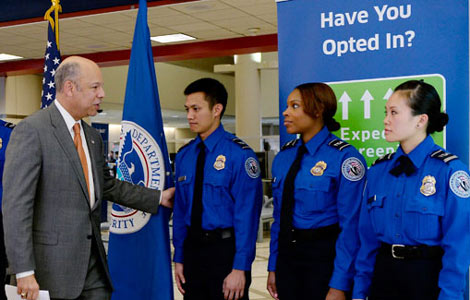
 US warns of airline shoe-bomb threat
US warns of airline shoe-bomb threat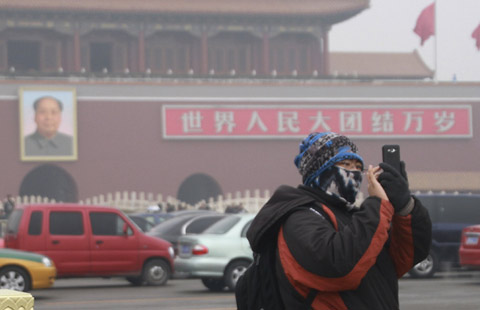
 Beijing issues 1st yellow alert for smog
Beijing issues 1st yellow alert for smog
 Beauty queen the latest victim in Venezuela unrest
Beauty queen the latest victim in Venezuela unrest
 Italy court finalizes Berlusconi divorce
Italy court finalizes Berlusconi divorce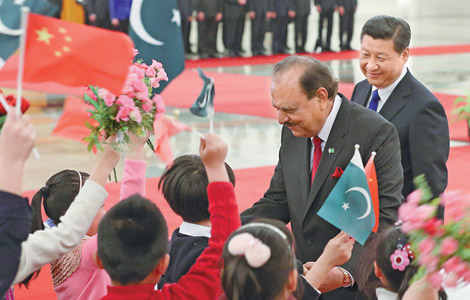
 Neighbors keen to open trade corridor
Neighbors keen to open trade corridor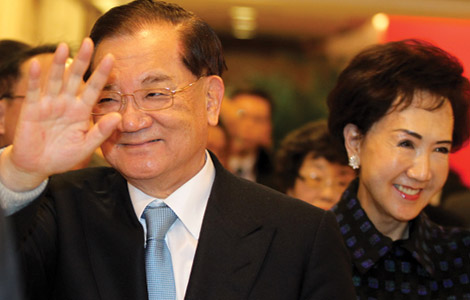
 Beijing wants more cross-Straits contact
Beijing wants more cross-Straits contact
 Spirit of adventure lives on in Antarctic
Spirit of adventure lives on in Antarctic
 Prince Charles dances in traditional Saudi dress
Prince Charles dances in traditional Saudi dress
Most Viewed
Editor's Picks

|

|

|

|

|

|
Today's Top News
China firmly opposes Obama-Dalai meeting
Americans view China 'most unfavorable'
US VP calls Ukrainian leader, warns of sanctions
Can Tencent crack US market?
Chinese can now cherry pick in US
Growth in emerging economies to decline: IMF
NYC Mayor caught breaking laws
IPhone makes gains in China
US Weekly

|

|
